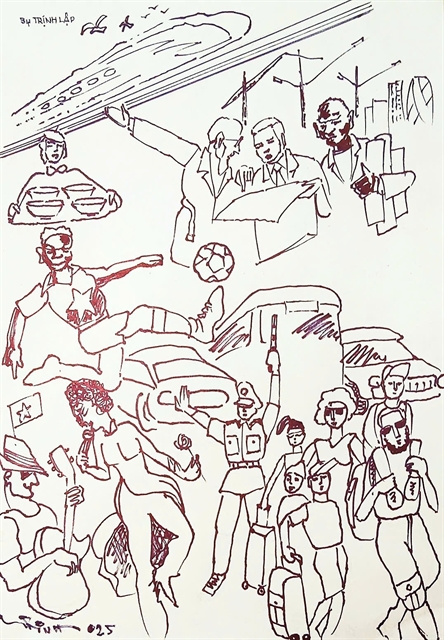 Talk Around Town
Talk Around Town

 |
| Illustration by Trịnh Lập |
Nguyễn Mỹ Hà
We have heard much recently about how Việt Nam plans to present itself to the world. The Ministry of Culture, Sports and Tourism is set to submit a proposal to the Government on a strategic plan to promote Việt Nam abroad in the final week of July. This will mark an important step towards portraying the country as one of peace, growth, prosperity and social equality.
Public awareness campaigns will be used to promote core Vietnamese values. A Vietnamese saying goes, "Có bột mới gột nên hồ", which literally means you need starch to make glue. If we as a country have no values, or only weak ones, how can we expect to present them proudly to the world?
For many years, the Government of Việt Nam has been working towards the goal of building a wealthy population and a strong country with a democratic, equal and civilised society. These objectives have not only served as development targets, but also reflect the nature of the socialist society that Việt Nam has long been striving for.
The vision includes a population rich both materially and spiritually, a strong economy, vibrant culture, capable armed forces and robust diplomatic ties. Above all, it envisions a democratic society in which the people are at the centre and everyone enjoys an equal and civilised life.
These aspirations are what Vietnamese society as a whole is working towards. The ultimate goal of governance should be the well-being of the people.
President Hồ Chí Minh once said that the revolution he led for independence must result in better lives for the people: “If our country is liberated, but the people remain hungry, cold, uneducated and without treatment for their illnesses, then that liberation means nothing to them. The people can only truly feel freedom and independence when they have food to eat and clothing to wear.”
He also said that we must strive for a society in which everyone has enough food and clothing, lives improve, all children receive an education, the sick have access to medicine, the elderly can retire and rest and those who are unable to work due to disabilities receive support from the state.
These goals may sound simple, but as a country, we have been working hard to achieve them – and although we are not there yet, steady progress has been made.
In 2024, Prime Minister Phạm Minh Chính launched a campaign to eliminate temporary and substandard housing for poor and near-poor households, as well as those affected by natural disasters and climate change. The campaign aims to mobilise all available resources to eradicate 230,000 inadequate homes by the end of 2025.
At the same time, the fight against corruption and counterfeit goods, particularly fake formula for babies and the elderly, as well as falsified medications, has remained a priority.
Following the drive to improve living conditions, the lifting of school tuition fees marks a first step towards the goal of free education, as set out by the country’s top leadership. For now, parents must still cover additional costs, including meals and extracurricular activities, among others.
If developments within Việt Nam are not genuinely positive, it will be difficult for the media and diplomatic efforts to present a positive image to the world.
In the field of international cooperation, the country continues to deepen ties with long-standing allies, never forgetting the support received during times of hardship.
Notably for Laos, a landlocked neighbour, Việt Nam has offered access to the Vũng Áng deep-sea port on the central coast, allowing Laotian goods to reach global markets. Although Việt Nam is not yet a wealthy country, it has chosen not only to promise support, but to act on it.
For Cuba, a friend now in need, Việt Nam has shared what it knows best: rice cultivation. To help ease Cuba’s food shortage, Việt Nam has sent its expertise halfway across the globe. The country has committed not only to sharing agricultural techniques and sending experts, but to building an entire rice ecosystem – including seed supply, machinery, fertilisers and irrigation systems, essential to wet rice cultivation.
In 2023, the world also witnessed the Prime Minister boldly call on the United States to lift its embargo on Cuba during a United Nations plenary meeting. Few global leaders have had the courage to deliver such a message directly to the US delegation in New York.
Việt Nam did not stop at words – it followed through with action. If the people of Việt Nam did not consistently exceed their limited resources and demonstrate their resilience – something millions of international visitors witness each year – then the campaign to elevate Việt Nam’s image abroad would lack the foundation it needs to succeed.
In the meantime, we must remain grounded, as daily efforts to combat corruption and abuse of power still require close public scrutiny. VNS




